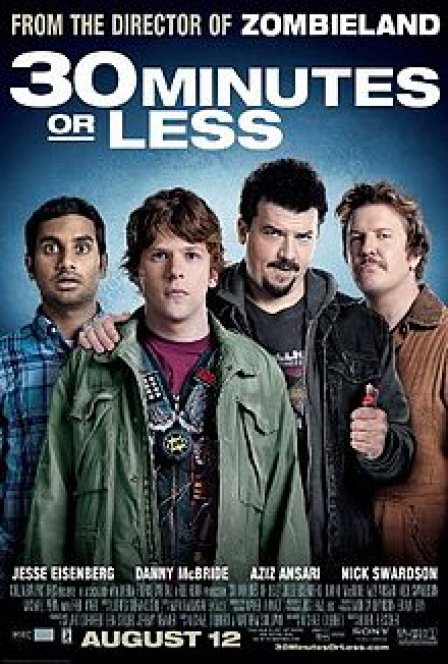Let me try to consider 30 Minutes Or Less slightly outside its niche of big-budget R-rated summer comedies — The Hangover Part II, Bridesmaids, Bad Teacher — and take it for a moment for what it wants to be. Aside from all the swearing, pop references, and wacky violence — the necessary ingredients for pleasing the young boys who will, god-willing, win it back its budget — Ruben Fleischer’s new comedy is about young men trying to make it — as friends and business partners — in the strip-malled outskirts of middle America. The best parts of the movie have a sense of life just to the left of the highway, in between the Family Dollar and the Taco Time. Its characters are overjoyed by the prospect of opening a tanning salon in a vacant storefront across the street from the Motel 8 and next to the Batteries Plus. Their proudest accomplishment, completely without irony, is delivering pizzas on time so as not to have their dwindling paychecks absorb the cost of the pie. There is the feeling, as this movie begins, that we’re seeing struggling, dreaming, not-too-high-aiming regular dudes at work.
It’s the juxtaposition of this feeling against the scurrilous, hyper, disjointed greater tone of the movie that, for better or for worse, sets 30 Minutes Or Less apart from those other summer-swearers. The tone is silly, it’s resolutely bro-comedy, and most of the jokes are low and broad. But you can’t help the feeling that there is a lining of better, more individual filmmaking around the edges, that Fleischer is a near-miss auteur. All I mean is that, among the directorial middle-class, where movies like this one are made reasonably well without intending to be much, there are also directors who have an interest in making better movies who just have no idea where best to use their skills. Fleischer likes to add a bit of style to the camerawork and the editing, and his story has some genuine emotion, but if faced with the question of whether to make a thoughtful buddy action-comedy or another bro-stoner flick, Fleischer will choose the latter every time — and the only reason seems to be that stoner flicks require less effort.
The story pits two sets of best friends against one another in the post-Downturn struggle for a buck any way it might come. Nick (Jesse Eisenberg) and Chet (Aziz Ansari), the first set, are suburban slackers mostly interested in blowjobs, beer, and action movies. Chet is a schoolteacher because it promises benefits and a steady paycheck. Nick is the pizza delivery boy.
The movie’s insanely mish-mashed tone kicks off in the opening credits, where Nick speeds his mid-80s Mustang through the strip mall parking lots and highway access roads of suburban Grand Rapids, Michigan, as if there were no difference between his character and the stunt driver shooting the scene. It’s supposed to be funny that Nick drives like a maniac in order to get his pizzas in on time, but whatever comedy surfaces undercuts any feeling we might get that he’s a real guy. The point: time is money. The big worry of Nick’s day job is fated to become the entire ticking-bomb plot of 30 Minutes or Less, when it’s his life, rather than his paycheck, that’s on the line.
The second set of friends, bumbling social climbers Dwayne (Danny McBride) and Travis (Nick Swardson), has hatched a plot to secure an inheritance from Dwayne’s rich father by strapping a bomb to Nick and forcing him to rob a bank. They insist on having the money in hand within 10 hours — that, or they detonate the bomb.
The movie isn’t called Ten Hours Or Less, only because there’s no cultural resonance to the phrase, but it is the drive to pay Dwayne and Travis that leads Nick and Chet around Grand Rapids in an increasingly ridiculous set of comic situations, only the first of which is the bank robbery. Things get so ridiculous, in fact, that we forget about any working-stiff sympathy the movie initially engendered and instead give over all of our efforts to hoping whatever comes next will make us laugh.
Less and less are we rewarded. At least Dwayne and Travis — seen raping a projected image of the hockey-mask Jason, taking lap dances far too seriously, building complex bombs, and wielding flame throwers — have a realistic goal in mind: they want to open the tanning salon and have it double as a lascivious massage parlor. The fact that they haven’t a clue how to achieve it provides what laughs this movie gets. Just like with any farce, regardless of quality, the plot backfires all over people’s faces. The bombs and flame throwers and strippers and rapists are all put to good use, as long as you’ve given up hope that any of the characters will resemble an actual person.
To make an insightful parallel, Fleischer and his screenwriters (Michael Diliberti here, Rhett Reese and Paul Wernick on Zombieland) have a reasonable goal as well: to make stylized, culturally relevant big-budget comedies. What’s actually funny about them is that they’re suffering from the same ill conceptions that they write for their characters.

